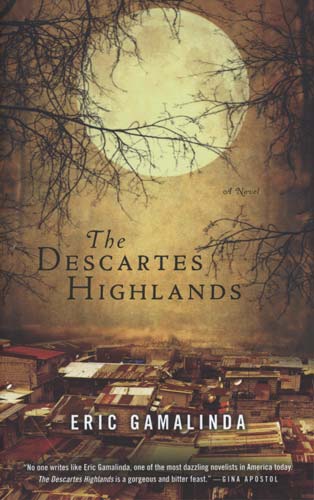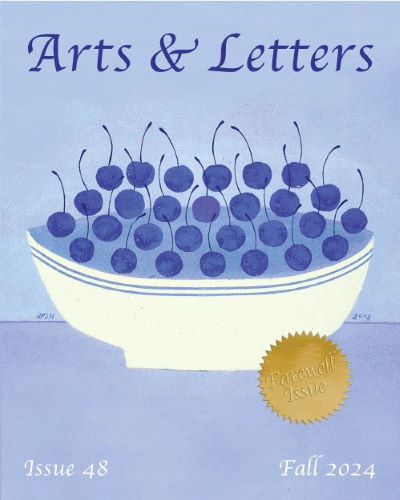The Descartes Highlands
If you are looking for a fast-paced, succinct, plot-driven book then The Descartes Highlands by Eric Gamalinda may not be for you. If, however, you are looking for a thoughtful, slow-burning character-driven story then settle right in. It is a story that follows two adopted brothers who grow up in different homes after being sold in the Philippines by their American father. Gamalinda’s novel delves into a world inhabited by an American draft-dodger living in the Philippines who ends up needing to sell his two sons to other foreigners, each burdened with their own grief and turmoil. We spend about a third of our time with the father in flashbacks and each of his sons in the present as they try to find out about their origins and deal with how their unique beginnings impact their lives. If you are looking for a fast-paced, succinct, plot-driven book then The Descartes Highlands by Eric Gamalinda may not be for you. If, however, you are looking for a thoughtful, slow-burning character-driven story then settle right in. It is a story that follows two adopted brothers who grow up in different homes after being sold in the Philippines by their American father. Gamalinda’s novel delves into a world inhabited by an American draft-dodger living in the Philippines who ends up needing to sell his two sons to other foreigners, each burdened with their own grief and turmoil. We spend about a third of our time with the father in flashbacks and each of his sons in the present as they try to find out about their origins and deal with how their unique beginnings impact their lives.
It felt so easy to get swept up in this novel. The language is beautiful but accessible and often had me sinking so deeply into the rhythm of Gamalinda’s prose that at times I would find myself jarred by a sudden reminder of the occasionally bleak subject matter. Each of the narrators has such a distinct voice that even subtle transitions between them were clear. The chapters focusing on the father, Andrew Brezsky, were the ones that stick out the most. All at once, Gamalinda gives us a narrator who is likable for his honesty, detestable for his actions, and demanding sympathy for his circumstances:
This is me, or my best attempt at a likeness of me.
My name is Andrew Brezsky. Several generations of my family, I’ve been told, migrated from England & Poland through Holland, Canada & finally the United States. I think I am a father. I have a son. Two. Maybe. I wonder if I can be a good father. Or will my picture burn in a 3-day bonfire, so they will never remember me. Maybe one day a wife & 2 kids, for real, maybe.
My name is Andrew Brezsky. I am an American, & though I’m aware that this shouldn’t be so, my being American is all I need to get by in this part of the world.
We rule. Nick believes this is like it’s the word of God. They’ll never harm an American, he says. They know they need every single one of us. Only America can save a country as fucked up as this.
One of the parts I appreciated most about The Descartes Highlands was Gamalinda’s willingness to discuss the often taboo topics of politics, religion, and abortion without fear or judgment. This aspect, the fact that he was so open to discussing these larger social issues, made my one large dislike about the book all the more disappointing.
The portrayal of women in The Descartes Highlands leaves something to be desired. To be fair, it could just be that we are reading the women through the viewpoint of men who are more than a little awkward in the world around them. There are a few moments that lead me to believe that Gamalinda is more aware of the sexism displayed by his characters than may have been obvious through a majority of the novel, particularly the following exchange between one of the sons and a woman he has been sleeping with:
“[ . . . ] You should feel lucky I’m showing some interest in your life. You come to see me only for a fuck. You haven’t even asked me what I do exactly, aside from the cello. If I’m in some orchestra or something. If I’m in some fucking band. You never ask me anything about my life.”
“Yes I do.”
“What have you asked me?”
“I asked you if you ever felt concerned that your boyfriend is away so often.”
The women in the novel, aside from the adoptive mothers of both boys, seem to exist purely for sex. When they try to have meaningful conversations or when it appears as though they are going to be developed further, it turns into an inner monologue by one of the men about sex or attraction or it becomes a sex scene. I found myself longing for one of them to be rejected by a woman because it seemed like all of them were so quick to offer it, almost to an eye-rolling extent at one point. Just because a neighbor picks up one of their packages and drops it off does not mean that the woman is expected to have sex with him immediately, particularly if it is the first time that they met. Maybe an invite inside for a cup of coffee but a quick “Thank you” would also have sufficed. This is not to say that confidence in one’s sexuality is to be stifled or looked down upon, but the female characters seemed to have less development because so many of their character traits were dependent upon having different reproductive organs.
That said, I have already recommended The Descartes Highlands to a few people and I’m sure I’ll continue to do so. It was a beautifully written book and Gamalinda deserves the praise that has been given to it so far. As his debut international novel, it succeeds in introducing Gamalinda’s style with sensitivity, humor, and poise. He writes about a condition that everyone can identify with—the need to define ourselves—by asking whether we do that by learning about our past or forging a path into the unknown future, a nod to the actual Descartes Highlands.





